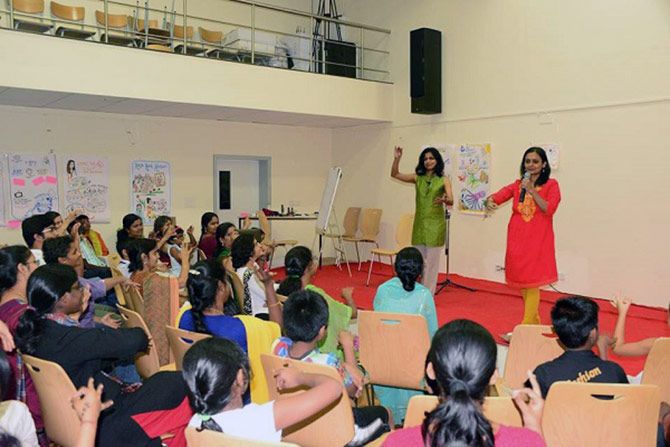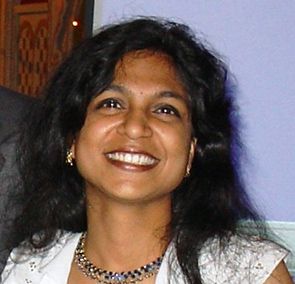 | « Back to article | Print this article |
Can creative story telling help children think differently?
Can parents' attitude towards children influence their life and career?
What can institutions do differently that can transform the lives of parents and children for the better?
A Bangalore-based start-up has the answers.
It was after witnessing what the conventional education system was doing to her own children that Aparna Athreya, an accomplished psychologist and storyteller, founded the Kid and Parent Foundation in Bangalore.
A bootstrapped and self-funded start-up, here she strives to provide a haven for inspired learning and fun to children and parents ravaged from the vagaries of the deeply flawed academic systems of our times.
Her ruminations here are a treasure trove of deep human wisdom and meaning.
In the following interview, Athreya tells us how human beings can preserve the child within them, the only real thing you will need to be successful in life, what makes stories the most powerful tool of human connection and the exact moment in her life when she realised she would be starting up.

What is the ‘The Kid and Parent Foundation’ about? What is the story behind its inception?
 Kid and Parent Foundation is an organisation that runs developmental programmes for children, parents and educators.
Kid and Parent Foundation is an organisation that runs developmental programmes for children, parents and educators.
It comprises a team of professionals from the field of human development coupled with creative professionals to conceptualise and design unique developmental programmes using storytelling, music, theatre and activity based learning.
The flagship programme of our organisation is the AHAM (A Holistic Awareness Model) programme where we provide socio-emotional development for early childhood.
The programme uses stories, music, role plays and activities as mediums of instruction.
The programme is aligned with the CBSE curriculum.
I think the reason for me to start this organisation was a combination of my passion, my children and spirituality.
My passion has always been in writing and telling stories and my children were the window to see the gaps in today’s education system.
However, the tipping point was a profound spiritual experience I had in Pondicherry at Sri Aurobindo’s ashram in front of The Mother’s shrine.
How difficult was it starting out? What kind of difficulties did you face? How did you overcome them?
To venture into the field of early development, which is seemingly full up in terms of the number of players, was daunting in the initial days.
Coupled with this, conceptualising and designing the programmes by using innovative and effective mediums rather than stereotypical ones was quite a challenge.
However, the biggest challenge we faced was to build awareness in the educational institutions about the importance of investing and believing in self-growth for our children from the early years.
It took a great deal of focus and hard work to deep-dive into the field of early development and identify the lacunae in our education system.
The path to building awareness has been long and hard and I continue to work towards getting people to understand the importance of helping children become emotionally safe and balanced individuals.
American author Ursula K Le Guin said, 'The creative adult is the child who survived.'
In what ways does the typical childhood and the education system rob us of our creativity? What can parents do differently?
Einstein famously said, 'Education is not the learning of facts, but the training of the mind to think.'
Isn’t it a great cause of wonder that in today’s India, we have several Indians in top notch positions in the corporate world but so few discoveries or inventions that we can take credit for?
Creativity is brimming in young children and would have continued to grow, had the adult in our society allowed for freedom of expression, freedom to emote, freedom to create and freedom to non-conform.
Few situations in real-life have one right answer; but we parents condition children to think that there is only one right way of doing things; from the way colouring should be done to the way we perceive good from bad.
In my opinion, parents should begin by allowing children to explore what they please, allow them to get bored, overcome their boredom, allow for mistakes and overcoming them; 'Freedom' is what a child needs to be given to realise their creative potential.
What factors restrict personal growth and development in adults? How are these issues addressed at your foundation?
One of the biggest reasons which desists personal growth is a resistance to change.
Growth, biologically, emotionally or spiritually does involve a change process.
But as children, we are conditioned to think that change is risky and most importantly given the 'I-told-you-so' attitude if they tried and did not succeed.
This ingrained behaviour roots itself as adults and we find it difficult to experiment with change.
My mantra for achieving personal growth, be it a child or an adult is the 3C process (Connect, Change and Consequence) and the 3R process (Read, Reinvent and Responsibility); Read yourself, keep Reinventing yourself and take Responsibility for how you turn out!
What role does adversity and struggle play in a person’s path to self-development?
Adversity and struggles are the fellow travellers on any journey and so it is on our path of self.
However, what I believe is important is that each of us is equipped to face and bounce back from adversities.
If every child grew up knowing that when she fails, she is one step closer to winning, we would have a lot more perseverance in our world.
There is a remarkable study that Angela Lee Duckworth presents in a TED talk about how 'grit' which is a combination of passion and perseverance is the biggest predictor of success.
Grit can be built only when we meet adversities, scale struggles and believe in the fact that failure is never a permanent condition.
What is it about storytelling that is so fascinating to human beings? How can it be used as a tool of self-improvement?
Storytelling is among the oldest known forms of communication and the fact that we have evolved and progressed over the millennia tells us that it has been a very effective mechanism.
The concept of 'story' is very relevant even in mythology.
It has been said that when the world was created, Shiva’s consort Parvati was fascinated by the wonder of creation and asked her husband to explain the phenomenon.
Shiva narrated the concepts of creation by telling her the longest story there ever is.
When you present knowledge as factual pieces of data, there is one part of our brain that gets stimuli.
However, when we listen to a story, something very different happens; a part of us that gets stimulated when we 'experience' gets fired up.
So, in a sense, story is the next best thing to 'experience' a tale.
I firmly believe that when a story is told, it connects the teller, the listener and the story in a very primal and deep way. That is why stories are said to be truly and deeply powerful.
How do clients sustain the level of actualisation they nurtured at the foundation after they are done with the programme?
Self-development is a continual process and we at the foundation work towards providing a basis for development while the ownership and sustenance lies with the individual.
However, the skills that we help foster in itself serve as sustenance mechanisms for actualisation.
For instance, we keenly promote self-reflection to gauge the why and the how of our responses and roles we play in our daily lives.
Reflection is best way for an individual, be it a child or an adult to take responsibility, evaluate and actualise.
What are some of the most desirable qualities to foster innovation, creativity and vitality in the human spirit?
Curiosity, mindfulness, and positivity, in my opinion are the most important qualities for fostering creativity.
Where did you secure funding from for starting up?
Most of it has been self-funded with a portion coming from family and friends. However, based on the current projection, external/angel funding options are being evaluated.
What has been the reaction from academic communities to the foundation? Any special customer testimonials you would like to share?
The reaction from academic circles has been extremely encouraging.
There are many parents, educators and school management teams who have commended and been inspired by our methodologies.
However, a child coming up to me after a session and looking as puzzled as pleased and saying 'Ma'am, I have never seen anything like this ever. Please don’t ever leave!' is probably the biggest testimonial of our efforts.
How has starting and operating the foundation enriched your life personally?
I have always loved this folk tale called the 'Lion’s Whisker' and it has many versions across the world from the west to the Far East.
The story is about a woman who has a loving husband who suddenly turns into an angry man after returning from war.
Not knowing how to deal with him, she goes to a witch-doctor who asks her to get a lion’s whisker in order to sort her husband’s attitude.
The lady braves many patient months with the ferocious lion winning his trust before finally managing to take a whisker back to the witch.
The witch takes one look at the whisker and throws it into the fire telling the woman that if she could win the heart of a lion and earn his trust, she most certainly was ready to deal with her husband.
I connect with the metaphor in this story because I see myself growing every day and discovering myself in more meaningful ways as I work towards helping others discover themselves.
If there was one advice you could give to those thinking of starting out on their own, what would it be?